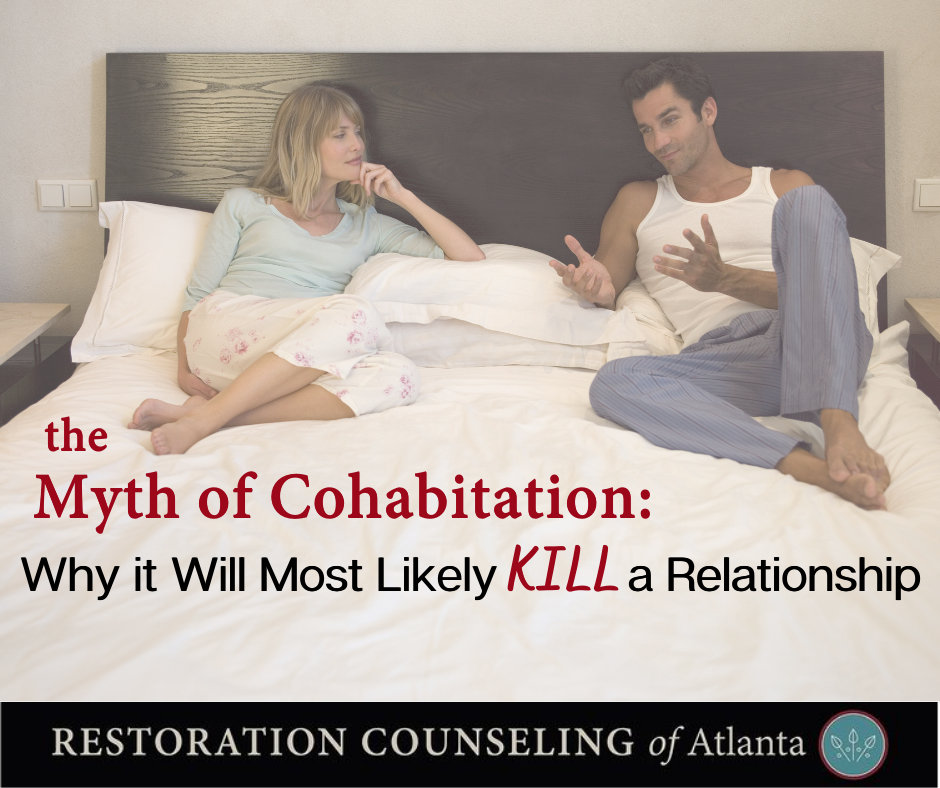So you have met the man or woman of your dreams. You are convinced that you two will spend the rest of your life together. You have dated for a while. What is the next step? Should you move in together?
This article explores some of the myths of cohabitation or living together before marriage from a biblical worldview for an audience that subscribes to biblical values.
Commitment, Satisfaction, and Consequences
Simply put, the strength of the commitment to the marriage by both partners will be the greatest factor in the relationship’s longevity.
Statistics show that two-thirds of couples who live together before marriage report less satisfaction than those relationships that waited until after marriage.[i] Why does this happen? Because standards and expectations are lower for a cohabitating partner than they are for a spouse.
Drs. Les and Leslie Parrott, along with leading researchers, have identified two significant causes of marital dissatisfaction.
- First, some couples progress from friendship to roommates that share a bed unintentionally. There is no celebration, ceremony, or blessing of family, friends, peers. Other times there is no long-term plan. Researchers coin this term as “sliding rather than deciding.”[ii]
- Another concept that reveals the consequences of cohabitation is “relationship inertia.” This is the unconscious merging of two lives, most notably in the financial, emotional, spiritual, mental, and physical arena. It is based more on proximity than compatibility.[iii] In other words, it becomes more difficult to separate lives over time, even if the relationship is less than ideal, conflicted, or even outright unhealthy.
John Gottman, the nation’s top relationship expert, shared that 69% of a couple’s problems are unsolvable.[iv] This means that commitment to focus on what works in the relationship and managing conflict will create a strong marital bond at the end of the day.
Debunking the Myths of Cohabitation for the Christian
Myth #1
We will save money by living together first.
Truth: Money will be saved, yet what will be sacrificed? I have found in couples there is usually a pursuer and an avoider. These are not explicitly male and female designations but how the couple’s dynamics seem to operate. In cohabitation, the pursuer is convinced that the relationship is moving forward, regardless of whether or not this is true. Meanwhile, it gives the avoider more time “to decide,” which may delay marriage.[v] Conversely, “gender asymmetry” can be present within live-in couples. Women see cohabiting as a step toward marriage, while men see it as a way to stall it.[vi]
Solution:
If cost saving is important, the best strategy would be to cook instead of going out, cut cable and monthly streaming subscriptions, downgrade expensive phone plans, and live within your means. Use the extra income to finish your education, pay down your debt, or go through premarital counseling to decide if marriage is the ultimate destination for your relationship.
Myth #2
Living together will help us get to know each other.
Truth: The best way to get to know each other is by asking questions, completing assessments, interviewing couples who have long-lasting marriages, and counting the cost of trading in the “I” for “We.”
Real vs. Ideal
In a relationship, we tend to put our best foot forward. Thus, we are essentially meeting a representative of that person. Conversely, each of us has irritating habits that drive our partner crazy. Understandably, you want to find these out before you get to the altar. However, when these characteristics are prematurely revealed through cohabitation, they may inject the relationship with ambivalence. As a result, their mate searches for the ideal partner, which I find unique to cohabitating couples. This indecision often causes a partner to be unsure of the relationship and their future.
Realistically, these undesirable behaviors only comprise about 20% of the partner’s characteristics. Finding these out after the “I do’s” invites a shift in focus to the other 80% of the partner’s qualities. This happens because a greater investment has been made.
The truth of the matter is that these habits are unlikely to change. Therefore, a decision must be made about whether or not you can forebear with these behaviors (Rom 15:1) without the additional complication of cohabitation.
How would/does their community feel about your decision to live together before marriage?
The close friends and family of a person, and even roommates, may provide greater insights than your partner may admit. You may learn more from them than from living with your partner.
An application of John 3:19-21 outlines that Jesus came into the world to be light. But people loved the darkness more than the light because their actions were destructive, and they fear their sins will be exposed.
Overcoming Shame through Healthy Community
When a Christian couple engages in cohabitation, this usually creates a sense of shame, especially if the relationship does not work out. Shame attacks your identity, i.e., “I am bad.” It typically results in withdrawal; however, shame only increases in isolation. I have frequently seen cohabiting couples leave the fellowship and return many years later, once the relationship disintegrates. Some do not return.
A better approach is to get involved in the community in which your partner engages. Over time this can give you a more balanced perspective. Every relationship has risks. That risk can be mitigated by having a strong community around you. That means having people to keep each partner and the relationship as a whole accountable and “in the light.” If your partner consistently tries to exclude you from friends, family, or fellowship with like-minded believers, consider that a red flag.
Myth #3
We can live together without having sex.
Truth: The Pew Research Center tells us that between 60 – 90% of people in North America engage in premarital sexual interactions.[vii] Living together before marriage decreases the chances the marital bed will be undefiled (Heb. 13:4).
Sex and Commitment
Does your love, devotion, and dedication to God’s plan bring you more satisfaction than the pleasure of being with your partner?
Having sex without marriage commitment will cause you to lose objectivity in deciding whether or not to stay in an otherwise unfulfilling relationship. Having premarital sex spiritually and physiologically surrenders the most intimate parts of us to someone who might not end up being our spouse. In addition, this activity can set up unrealistic expectations that the sexual experience will be similar throughout the marriage. This will often change due to a medical condition or during certain seasons such as pregnancy, or in the later years.
Our sexuality belongs to the Lord first. Then, it can be shared with our partner in the confines of an everlasting commitment.
Setting God-Honoring Boundaries
Set limits on touching and kissing early in the relationship. Establish how you will honor God with your body before you fall into temptation. If you have already gone too far, establish new boundaries. Seek healing through wise counsel or therapy, and identify multiple people who can hold you accountable. Hold off having sexual relations and moving in together until you are married with a lifelong commitment.
Myth #4
Living apart before marriage is old fashioned.
Truth: Marriage itself is the oldest institution we have as humans. It was created by God. Therefore, it makes sense to implement what the designer intended to secure His blessings on the union (see Genesis 1:27, 2:24; Matthew 19:4-5; Proverbs 5:18-20; 1 Corinthians 7:1-5).
The Cost of Breakups After Cohabitation
I have witnessed countless calamities experienced by breakups of live-in boy/girlfriends or fiances. These have included verbal and physical fights, law enforcement involvement, broken leases, disputes in vehicle ownership, conflict in bank accounts, lawsuits, and the list goes on. Do these things happen in marriage? Of course, but there is no legal process or legal protection designed for almost-married couples.
There is also an emotional consequence of having trust broken. This may result in suspicions that will affect future relationships, and a long healing process because the two were operating as one (Eph. 5)
Solution
Live on your own, with friends, relatives, have a short engagement, get married, or decide to separate. Consider which option will bring the most honor to God and not degrade a future marriage or person.
The Ultimate Truth
Two Christians in a relationship do not automatically make it a biblical relationship or one that pleases God. When a couple sets up and maintains biblical values, principles, and boundaries that honor the Lord, His blessings follow obedience and a willing heart.
Leaning on one’s faith community for accountability is an important step in the journey committed to unity that leads to a Christ-centered marriage. I highly recommend enrolling in premarital counseling to get ready for your next step. Consider these truths and myths and determine for yourself whether cohabitation will enhance or destroy a relationship that seeks to honor Christ.
 by James E. Francis, Jr., EdD, APC
by James E. Francis, Jr., EdD, APC
Available online
james@restorationcounselingatl.com
James helps with anxiety, anger, depression, life transitions, resilience, and spiritual maturity. He believes that therapy should be clinically excellent and theologically accurate. He prioritizes the integration of Scripture with elements of psychology to operate a holistic growth model. James uses reflective prayer to help individuals align their beliefs with Scripture. He then walks beside them to promote step-by-step healing from the pain of the past. James’ goal is to hold individuals accountable through encouragement and empowerment by activating their drive toward spiritual maturity.
Resources:
Portions of this article were adapted from Drs. Les and Leslie Parrott’s Saving Your Marriage Before It Starts (SYMBIS) training on Cohabitation & Premarital Sex. The views expressed here are solely that of the author and do not represent the Parrott’s, SYMBIS, or Restoration Counseling’s expressed thoughts or opinions. Visit LesandLeslie.com for more information.
[i] Stanley, Scott M., et al. “Maybe I Do: Interpersonal Commitment and Premarital or Nonmarital Cohabitation.” Journal of Family Issues, vol. 25, no. 4, May 2004, pp. 496–519; Juliana Menasce Horowitz, Nikki Graf and Gretchen Livingston. The Pew Research Center. “Marriage and Cohabitation in the U.S.” November 6, 2019. https://www.pewresearch.org/social-trends/2019/11/06/marriage-and-cohabitation-in-the-u-s/
[ii] Parrott, Les and Leslie Parrott. “Cohabitation & Premarital Sex: Morals, Research and Reality.” Saving Your Marriage Before It Starts Assessment,” 2020, 15.
[iii] Stanley, Scott M., Galena Kline Rhoades, and Howard J. Markman. 2006. “Sliding Versus Deciding: Inertia and the Premarital Cohabitation Effect.” Family Relations 55 (4): 499–509
[iv] Gottman, John M, and Nan Silver. The Seven Principles for Making Marriage Work. New York: Three Rivers Press, 1999.
[v] Willoughby, Brian J., and Dallin Belt. “Marital Orientation and Relationship Well-Being among Cohabiting Couples.” Journal of Family Psychology, vol. 30, no. 2, Mar. 2016, pp. 181–192
[vi] Kline Rhoades, Galena, et al. “Pre-Engagement Cohabitation and Gender Asymmetry in Marital Commitment.” Journal of Family Psychology, vol. 20, no. 4, Dec. 2006, pp. 553–560.
[vii] Diamant, Jeff. The Pew Research Center. “Half of U.S. Christians Say Casual Sex Between Consenting Adults is Sometimes or Always Acceptable.” August 31, 2020. https://www.pewresearch.org/fact-tank/2020/08/31/half-of-u-s-christians-say-casual-sex-between-consenting-adults-is-sometimes-or-always-acceptable/

